danbricklin.com/log
|
||
|
|
Starting April 14, 2003
Great examples of small business weblogging, Pictures of Dean Kamen speaking in Cambridge last month, An example of the Internet helping artists, Jupiter ClickZ Weblog Business Strategies Conference pictures, MIT EECS Department 100th Anniversary, SMBmeta takes another step with new sample applications, More about the flamingos, Flamingos on the lawn as a neighborhood works together, Doonesbury integrates the web into the strip, Material on SATN.org, More about paying and Buskin and Batteau, How will the artists get paid?, More VisiCalc material
14Apr03-27Jun03
2003_04_14.htm
|
|
|
Great examples of small business weblogging [link]
This morning I got this email from Griff Wigley of Wigley & Associates:
Dan,
Just a heads-up... your article at http://danbricklin.com/log/businessblogging.htm has helped me to put it into practice with my clients.
In today's St. Paul Pioneer Press (Knight-Ridder paper):
Blogging for Business
Keep up the good work!
- Griff
It seems that Griff helps small businesses and other organizations (including politicians) put up weblogs. He lists many on his Clients page. Look at them -- they are SO "small business" and great examples to show what blogging can be like.
Pictures of Dean Kamen speaking in Cambridge last month [link]
Segway's Dean Kamen spoke at the MIMC Fireside Chat on May 29, 2003. He was interviewed by the Boston Globe's Scott Kirsner. You'll find lots of pictures and some notes on my "Dean Kamen at MIMC Fireside Chat" page.
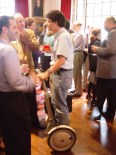 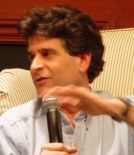 Dean Kamen before and during his talk
An example of the Internet helping artists [link]
I've written about how important being paid for live performance is to many musicians and how important a "fan base" is. I've also written how the Internet has changed the economics of marketing to that fan base. (See "How will the artists get paid?")
Today I ran across an interesting example of the power of the Internet to help market musicians in an article in the New York Times titled "A Festival To Make Deadheads Grateful". The article is about the Bonnaroo music festival in Tennessee. Here's the quote (emphasis added):
Without newspaper, television or radio advertising, and without using Ticketmaster, Bonnaroo sold out its 80,000 tickets this year in 18 days. Last year, with no track record, it took 18 days to sell 70,000. The organizers had planned to try promoting it themselves and eventually using Ticketmaster, but when they sent a single e-mail message to the fan clubs of the major bands at the core of the festival and sold 12,000 tickets the first day, they realized the power of Backpacker Nation. "We'd heard about the promise of the Internet," Mr. Capps said, "but here we really experienced it."
The tickets cost well over $100 each (and there were $475 VIP tickets, too, for sale), so they raised over $10 million pretty quickly.
Another thing. According to the festival web site home page (emphasis added again), there is a real appreciation for people's desire to make their own mixes on their own CDs:
THANKS TO OUR SPONSORS
Check out the Bonnaroo Music Sharing Village where AOL for Broadband has provided all the necessary equipment to burn your own CD! Our jukebox contains dozens of pre-cleared tracks that festival artists have graciously given us so you can create your own souvenir Bonnaroo mix CD. Blank media will be provided at the Village free of charge.
Special thanks to Verbatim, the world's leading producer of high quality CD, DVD and removable storage media. Verbatim will be providing custom printed Digital Vinyl CD-R media, which concert-goers can use to burn a free CD from the great selection of music from artists featured at this year's Festival. Digital Vinyl CD-R is the latest recordable media to hit the streets. Designed with the retro look and feel of a 45-rpm record the discs make a great mix even better.
"Pre-cleared tracks" from the artists! Souvenir CD-R's with special labels. Pretty cool!
Jupiter ClickZ Weblog Business Strategies Conference pictures [link]
I attended the first day of the Jupiter ClickZ Weblog Business Strategy Conference yesterday, along with lots of other well-known people from the blogging world. My contribution online: Pictures, as usual.
More than half the audience seemed to have laptops open at all times:
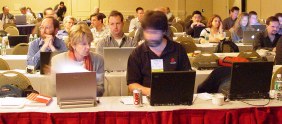 My view from on stage while participating in a panel
MIT EECS Department 100th Anniversary [link]
A little over a week ago I attended part of the MIT Electrical Engineering and Computer Science Department's 100th Anniversary celebration. I was only able to attend one morning of the two days, but there was still stuff worth writing up.
One interesting picture I took during a break: Jay Forrester, the head of the Whirlwind project at MIT (over 50-some years ago, before I was born), the granddaddy of realtime digital computing, was trying a Segway. He did work on feedback systems, both electronic, mechanical, and economic (with systems dynamics). Here he was, for the first time on a great example of realtime computing and feedback, the Segway. I had to take a picture and share it:
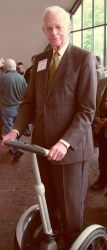 Jay Forrester on a Segway HT
Can those of you in your twenties or early thirties working on some cool system today imagine what products directly descended from your work that you'll be able to try 50 years from now? Compare some pictures of Whirlwind to the Segway.
SMBmeta takes another step with new sample applications [link]
I just released some applications that implement a simple SMBmeta ecosystem, including a directory of businesses. For more information, read the weblog entry on TrellixTech.com. This is all experimental stuff, complete with source code (Perl accessing MySQL).
With this, the SMBmeta specification is pretty filled out, and ready for people to start creating and registering data files. You can use the tools on www.smbmeta.org. It would be great if we could get a large number of different businesses registered (i.e., not just IT consultants...). Already there is a quilt shop, realty company, detoxification hospital, and more.
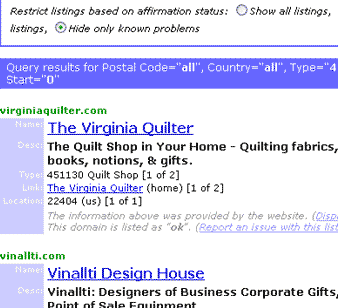 Sample output from Directory of registered domains with SMBmeta information
Implementing all this has been an interesting learning experience. I'm relatively new to Perl and SQL databases. It has really helped me learn more about the state of the Internet and how things have come about.
More about the flamingos [link]
There is more about the Newton flamingos in an article on TheBostonChannel.com from May 19-20, complete with a video report that gives a great view.
Flamingos on the lawn as a neighborhood works together [link]
There is an interesting little story going on in part of my town of Newton, Massachusetts. As I understand it (this is second hand), there is an artist who moved to an expensive neighborhood in town who used to live in Florida. She missed some of the elements of Florida, so she got some of those plastic flamingos and arranged them in an interesting display on her lawn. So, the story goes, someone came up to her and complained, saying that in such an exclusive neighborhood they don't have such tacky displays on their lawns. Hearing about this, a few of her neighbors came to her defense. They procured more flamingos, and arranged them on their own lawns in an integrated display. As others in the neighborhood found out about this, they got more and added further interesting displays. You see flamingos nesting in bushes and trees, you see them "walking" two by two from lawn to lawn. Some are large groups, some are discreet individuals. It is really cool. Recently, I even saw a sign added below one of the street signs saying "Flamingo Rd" or something. People I know who walk or drive by these houses just smile and smile at the fun display of "flamingo art" and neighborhood solidarity. At the rate this is growing, the whole section of town will be covered in a couple of weeks.
Here are some pictures I took a couple of weeks ago as it was just starting to grow. I went by yesterday and it had grown to many more houses:
  Flamingos "walking" from house to house
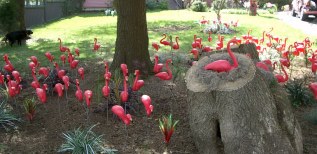 Flamingos "nesting"
Doonesbury integrates the web into the strip [link]
I'm always interested in indications that technology has made a major leap in being accepted by everyday people. For me, I got a personal feeling about this on September 5, 1985, when the Wall Street Journal wrote in an editorial: "We've been reading stories this week about all the returning Members of Congress who say that virtually none of their constituents are interested in Ronald Reagan's tax reforms. Could be, but we doubt it. Our guess is that people everywhere have by now filled Visicalc spreadsheets, endless pages of eight-column accountant's paper, yellow legal pads, blank stationery and envelope backs with calculations of how they'd fare with the president's tax-revision proposals..." Here they didn't go to the trouble to explain what VisiCalc was -- it was assumed that Wall Street Journal readers knew what it meant and knowing what it meant was part of making a point about something else, not technology. And this was in an editorial, not an article in the technical section.
We had an interesting milestone today in the Sunday comics pages. Many comics include links to the corresponding web site. Foxtrot used to have explanations on the web site for punch lines that were too technical. (This is a common need for that comic strip. For example, in February 25, 2002, Jason bragged to his computer that he has Unix underpants which say "CHMOD 700 *, baby" -- non-techies needed help to learn it meant set access only to owner. Foxtrot was also one of the first I found to mention spreadsheets and you needed to know something about them to get the joke -- another milestone in my life.) But today took the cake: The Doonesbury comic was almost completely in French. A little note below the last panel told you to go to doonesbury.com for a translation. To really understand the comic, unless you knew French well enough to get by, you needed to go to the web and Trudeau just assumed you would do that. Pretty cool. It reminds me that the tag lines on public radio now almost completely include URLs and rarely use telephone numbers for more information.
Material on SATN.org [link]
I haven't posted anything here on this weblog for a while, but that doesn't mean I haven't been posting at all. I've put a few items on SATN.org. They seemed a little more appropriate for there at the time, and had no pictures. As usual, though, I'll link to my other posts if I feel that people found them of interest.
Here are some links:
More about paying and Buskin and Batteau [link]
I added a bit to the end of my "How will the artists get paid?" essay in reaction to a posting by Mark Bernstein. I also added some material at the end of my Buskin and Batteau essay which includes a link to a (legal) excerpt from one of their songs that evokes in me an image of the drive of a small business person.
On a related note, I hear from Dan Gillmor that "Robin [Batteau] played on both of the albums my band recorded back in the '70s." Another one of those "whoa!" feedbacks from a posting on the web.
How will the artists get paid? [link]
There is a lot of controversy about digital media, copy protection, fair use, and internetworking. In most cases from the viewpoint of legislators trying to react to lobbyists, as I understand it, it boils down to one question: How will the artists get paid? My answer is simple: The same way artists have always gotten paid. I wrote an essay to examine that issue to see how it applies to today's world.
The bottom line? "Throughout history there have been a variety of ways that artists have gotten paid so they can create their work: Through an ecosystem which looks to a mixture of amateur, performance, patronage, and commission forms of payment... Listening to representatives from the recording and movie industries, you would think that selling fixed artifacts is the only way that artists can get paid. That has never been the case, and should not be in the future or else society and art itself will suffer. Those publishing businesses may be based on that one form of payment, but the artists' livelihood need not."
I also give the example of two of my favorite singer/songwriters, explaining how I became a fan and some of how they have made money over the years. See "Buskin and Batteau".
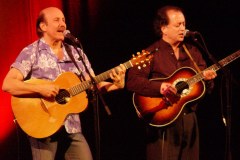 David Buskin and Robin Batteau in concert in Somerville, MA, in 2003
More VisiCalc material [link]
Two more VisiCalc-related items from the Computer History Museum event last week: Bob Frankston wrote a very extensive essay about Implementing VisiCalc for his web site. It includes a lot more technical details than you'll find anywhere else. Larry Magid posted a copy of a radio interview he did with me the night of the event. The video of the event itself has not been posted, yet, by the museum. It usually takes them several days.
|
||
|
© Copyright 1999-2018 by Daniel Bricklin
All Rights Reserved.
See disclaimer on home page.
|
||